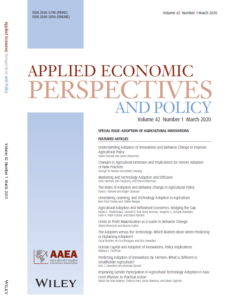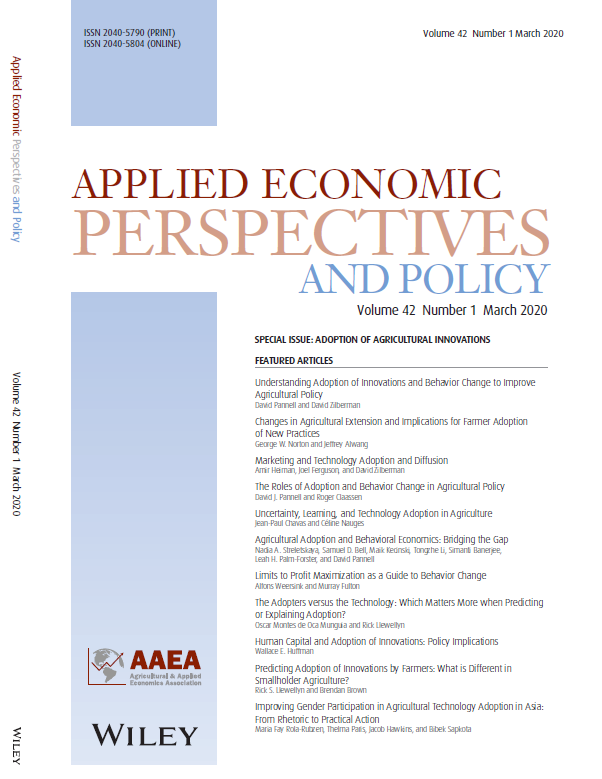335. Behavioural economics and adoption of agricultural innovations
Behavioural economics has become a thriving field of research over the past decade or so, but research by agricultural economists on farmers’ behaviour when adopting new practices has been going on for over 60 years. What is similar and different between these two fields of research?
I was listening to a presentation by David Zilberman from the University of California, Berkeley at a conference a few years ago, and he made a comment along the lines that agricultural economists had been studying behaviour for a long time before behavioural economics became popular. He was thinking about the large body of research on farmers’ adoption on new practices and technologies.
 When I was putting together a recent special issue of Applied Economic Perspectives and Policy on adoption of agricultural innovations, I remembered David’s comment and thought that a paper about this would be a good inclusion. About that time I happened to visit the University of Alberta, and a conversation about this with Maik Kecinski (now at University of Delaware) led to a team of young economists (plus a not-so-young one: me) working together. The resulting paper, “Agricultural Adoption and Behavioral Economics: Bridging the Gap” by Streletskaya et al., is now out and is open access.
When I was putting together a recent special issue of Applied Economic Perspectives and Policy on adoption of agricultural innovations, I remembered David’s comment and thought that a paper about this would be a good inclusion. About that time I happened to visit the University of Alberta, and a conversation about this with Maik Kecinski (now at University of Delaware) led to a team of young economists (plus a not-so-young one: me) working together. The resulting paper, “Agricultural Adoption and Behavioral Economics: Bridging the Gap” by Streletskaya et al., is now out and is open access.
To get a brief overview of the paper, you could listen to a conversation with one of the co-authors, Leah Palm-Forster, who happened to be in Perth for the AARES conference last month, which luckily took place just in time to avoid most of the travel shut downs for Covid-19. My conversation with Leah is available as an episode of the AEPP podcast series.
The paper covers a lot of ground. Here I’ll just comment on some of the similarities and differences between the two fields of research. Clearly, both fields are interested in behaviour, both recognize the influence of individual characteristics, preferences, and beliefs on decision-making, and both study economic decisions. But they tend to ask somewhat different questions. Quoting from the paper:
“Agricultural adoption investigates which factors drive or inhibit uptake within a population over time, without necessarily seeking to identify and model behavioral mechanisms that influence adoption. Behavioral economics, on the other hand, seeks to identify and explain behavior that departs from what is predicted by traditional economics through the use of new theories and models of human behavior.”
“Furthermore, agricultural adoption research traditionally has highlighted the role of extrinsic factors such as social, economic, and political context in driving adoption. Behavioral economics, on the other hand, focuses on broadly unpacking the “black box” of human decision making and explores how human cognition and the manner in which tastes and preferences are formed drive decision-making, and how factors such as biases and other social influences impact economic behavior.”
“Agricultural adoption often analyzes field data available at the plot, county, regional and national levels for different types of producers in order to obtain insights about the drivers of new technology diffusion over time and adoption patterns across different farming populations. In the behavioral economics domain, … many laboratory and field experiments rely on smaller samples and consist of cross-sectional data.”
So, there are quite a few differences. But they don’t have to be different. These differences have just evolved organically, largely reflecting the different questions that the researchers were asking.
Researchers working on agricultural adoption are increasingly looking towards behavioural economics for ideas and methods, but I reckon there is also unrealised scope for cross-fertilisation in the other direction. I suspect that many behavioural economists don’t even realise that there is this other big body of research generating knowledge that is relevant to what they do.
Further reading
Streletskaya, N.A., S.D. Bell, M. Kecinski, T. Li, S. Banerjee, L.H. Palm-Forster, and D.J. Pannell. 2020. Agriculture Adoption and Behavioral Economics: Bridging the Gap. Applied Economic Perspectives and Policy 42(1), 54-66.

Dear David,
thank you for this inspiring discussion contribution and the nice podcast spiced with probably your music! The paper is a very valuable contribution to the field of agricultural economics. I highly recommend this paper as it shows the different perspectives of economic disciplines. This is decisive for the development of the discipline and the mentioned cross-fertilisation. Congratulations!
Cheers
Andreas
Thanks for your very kind words Andreas. I hope you and you’re family are well. Most of the things I release with music in them are played by me, but not these podcasts for the AEPP special issue, which are expertly put together by Allison Scheetz in the AAEA.